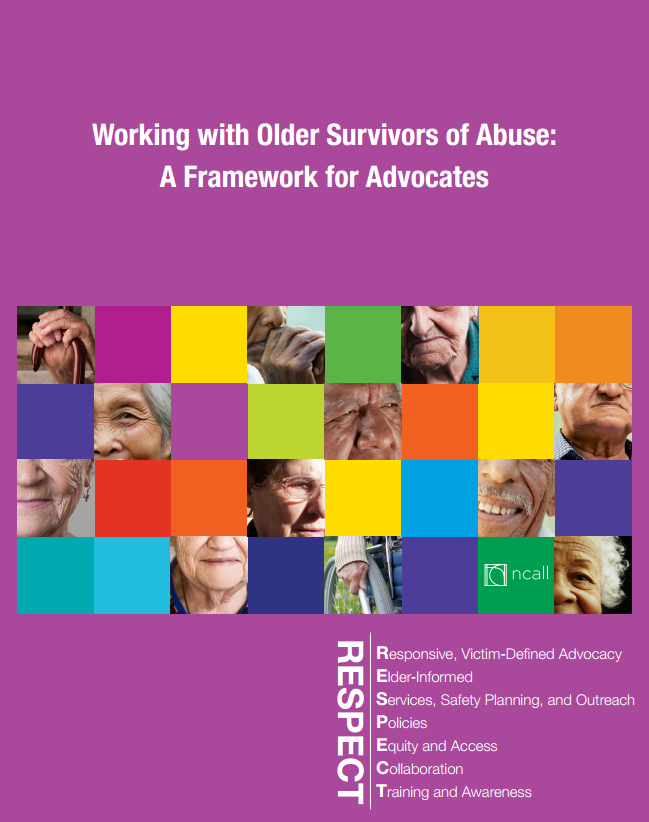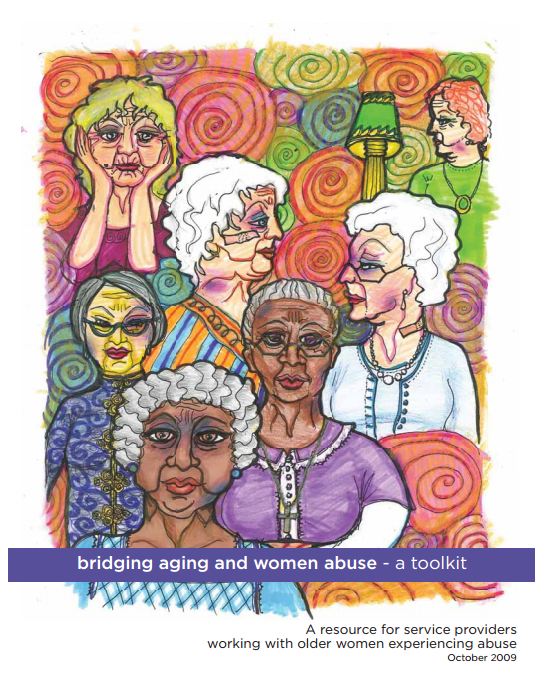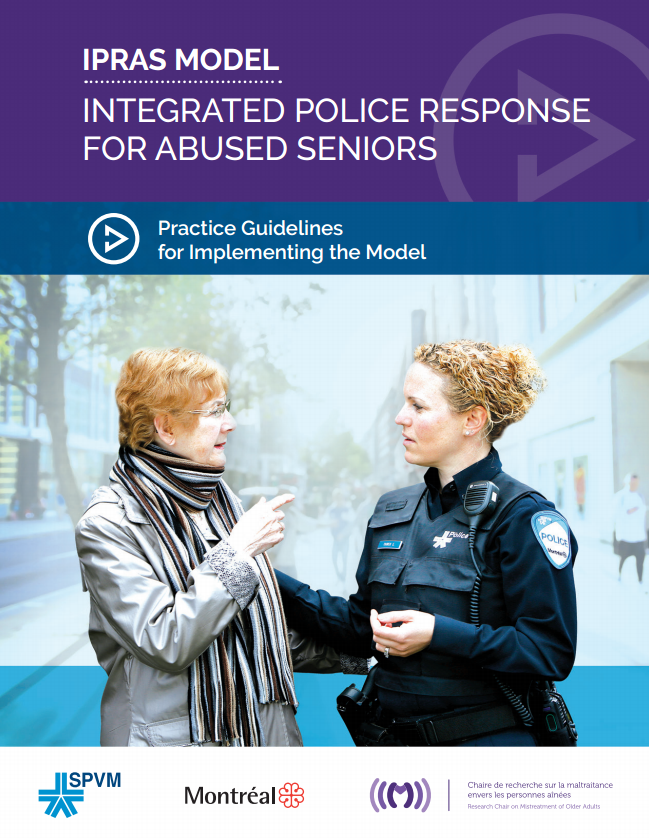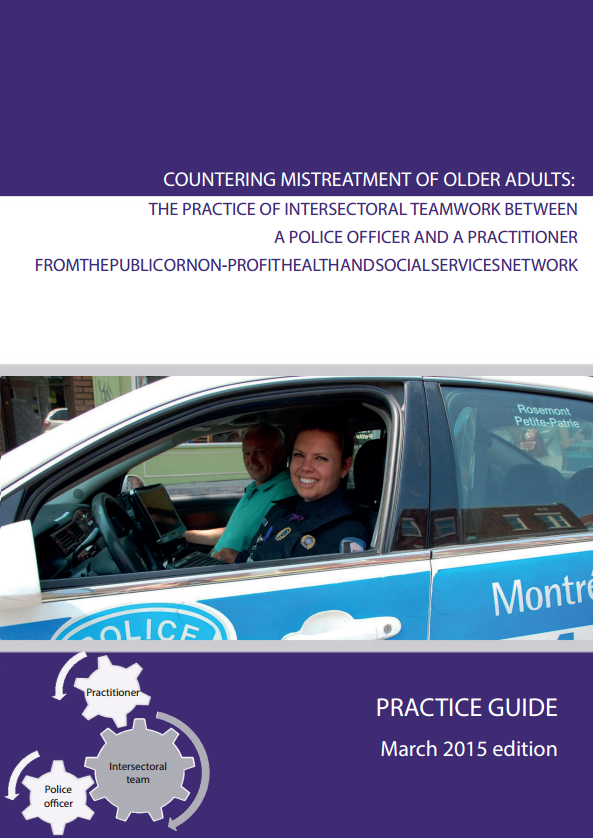Practice Tools
The following resource is part of the Family Violence Initiative, funded by the RCMP. Find similar tools by searching for the FVIF tag or consult the list of available resources.

1) this summary report,
2) a self-assessment workbook and resource lists, and
3) training modules.
These materials are designed to enhance responses to older survivors of abuse by community-based domestic violence (DV) and sexual assault (SA) agency staff and volunteers. This summary report begins with a brief overview of elder abuse and abuse in later life.
Subsequent sections describe seven key guiding principles as well as minimum guidelines and practice strategies for advocates to consider in their work with older survivors."
Source: National Clearinghouse on Abuse in Later Life (USA)
The following resource is part of the Family Violence Initiative, funded by the RCMP. Find similar tools by searching for the FVIF tag or consult the list of available resources.

This toolkit was developed to support a more coordinated and effective community response to older women abuse. Older women are one of the fastest growing population groups and as the baby boomer generation age, the number of older women experiencing abuse will likely increase. The most recent Family Violence in Canada profile indicates that older women are more likely to be victims of family violence than men and that this rate has been steadily increasing since 1998. Previous work by the project team, as well as other research and reports, indicate that older women experiencing abuse are often caught between service systems. For example, older women may not identify with elder abuse programs, which largely assume that abuse occurs in a caregiving context and typically do not address the gendered nature of abuse. Likewise, domestic violence services are often perceived to be for younger women with children and may not have age-appropriate supports in place. For some older women these gaps in support lead to homelessness and homeless shelters where neither aging nor abuse is well addressed.
Although promising practices are emerging in response to these gaps, few tools have direct input by older women who have experienced abuse and the gaps in service systems. Further, few tools provide resources for service providers and older women to use while working together. We have built on but not replicated existing resources. We acknowledge all the important work1 we drew upon but emphasize that THIS IS NOT ANOTHER MANUAL. It is an innovative and relevant compilation of ideas and tools that can be used to support an effective and empowering response to older women abuse.''
Source: National Initiative for the Care of the Elderly
The following resource is part of the Family Violence Initiative, funded by the RCMP. Find similar tools by searching for the FVIF tag or consult the list of available resources.

As first-line responders, police officers are called on to act in a variety of situations involving mistreatment—in the home or in an institutional setting. In addition to the connections they form within the community, their status as first responders positions them as privileged players in the response to prevent and counter mistreatment of older adults.
The IPRAS Model (Integrated Police Response for Abused Seniors) relies in particular on the concerted and complementary efforts of police officers of all functions within a service. Its most important component integrates the five aspects of police response and is supported by four other components (guidance and coaching of the practice / cross-cutting support / coordination / strategic management and leadership) for continuous improvement in responding to mistreatment of older adults."
Also available:
The following resource is part of the Family Violence Initiative, funded by the RCMP. Find similar tools by searching for the FVIF tag or consult the list of available resources.

- Documents that present the IPRAS Model implemented throughout the SPVM since May 2016;
- Examples of tools and documents developed to implement and to support the implementation of the model in the SPVM.
These tools and documents are available to all police services interested in implementing the IPRAS model. They serve as examples that can be adapted."
Also available:
Integrated Police Response for Abused Seniors - Practice Guidelines
The Practice of Intersectoral Teamwork between a Police Officer and a Practitioner from the Public or Non-Profit Health and Social Services Network - Practice Guide
Source: Research Chair on Mistreatment of Older Adults
The following resource is part of the Family Violence Initiative, funded by the RCMP. Find similar tools by searching for the FVIF tag or consult the list of available resources.
"This practice guide stems from the Bridging project, an action-research project that leveraged intersectoral practices to counter mistreatment of older adults. The project entailed three case studies, which were performed in the northeast of Montreal between the years 2012 and 2015.
In 2012-2013, various partners of the Bridging project from different activity sectors in Montreal (public safety; health and social services, from both the public and non-profit network), put forward their views on an intersectoral practice model to counter mistreatment of older adults (see back cover of this guide).
In 2013, these partners identified a breakthrough practice, namely working in intersectoral teams (simply designated as “team” throughout this guide) which consist of a police officer and a practitioner . Considering the benefits of this practice, they expressed the wish to document, model and disseminate it. Three teams were studied for this purpose: one team for transferring the know-how to other teams, one team for implementing its practice and one team for developing its practice. The members of the respective teams under study were from various organizations, but for practical considerations, they are referred to in generic categories in this guide."
Also available:
Integrated Police Response For Abused Seniors - Practice Guidelines
Integrated Police Response for Abused Seniors (IPRAS) - Online Toolkit
Source: Research Chair on Mistreatment of Older Adults
Page 7 of 15

















